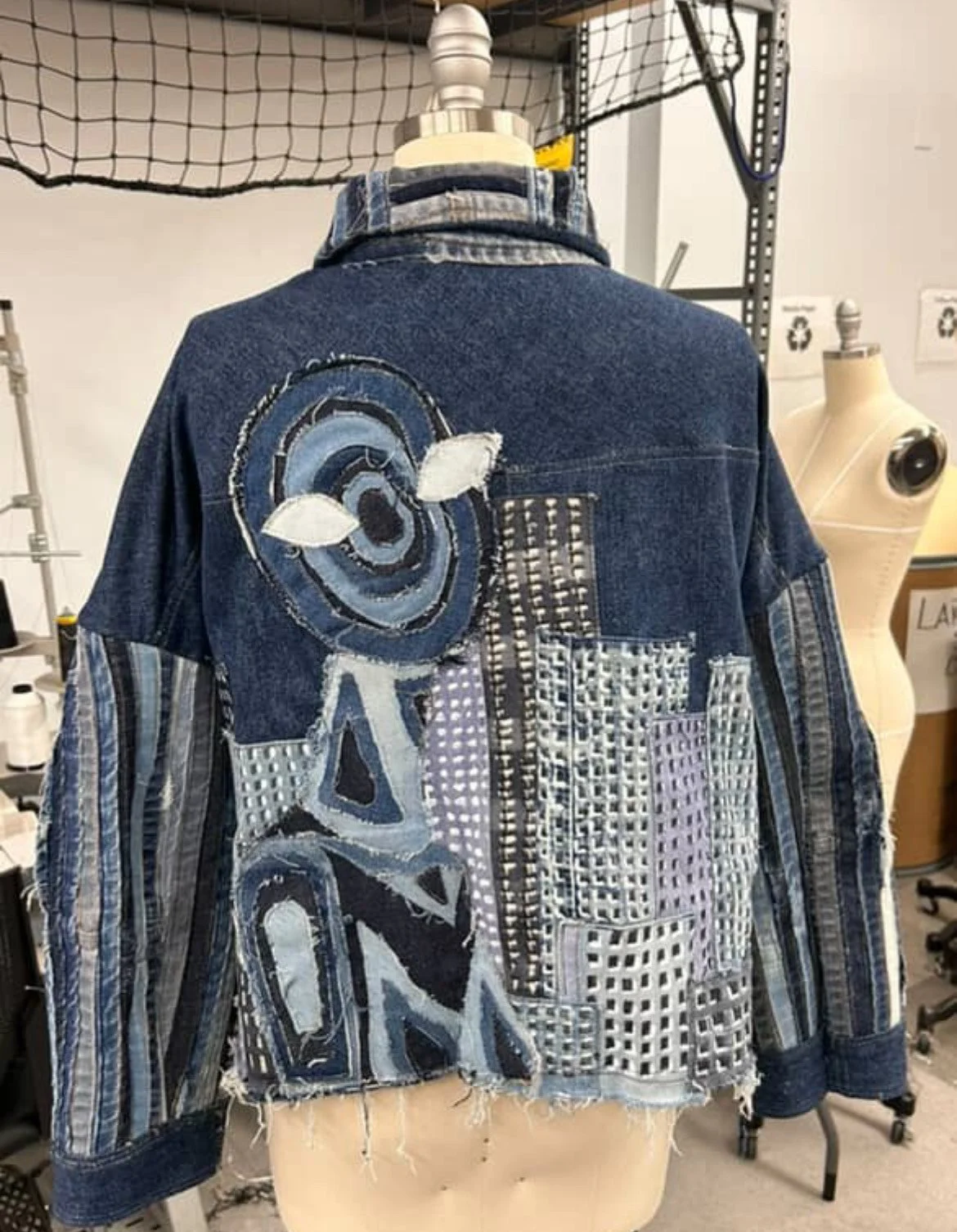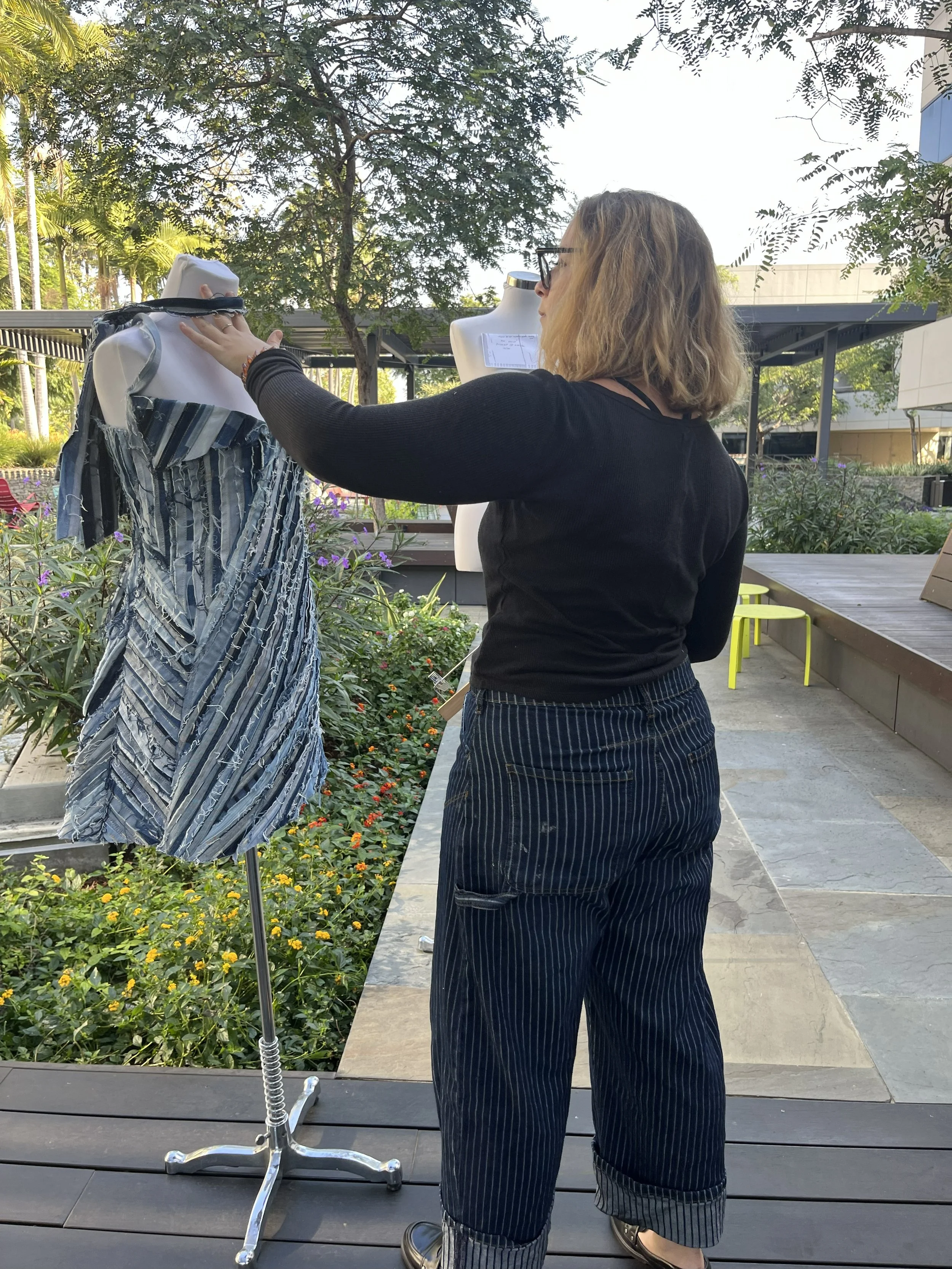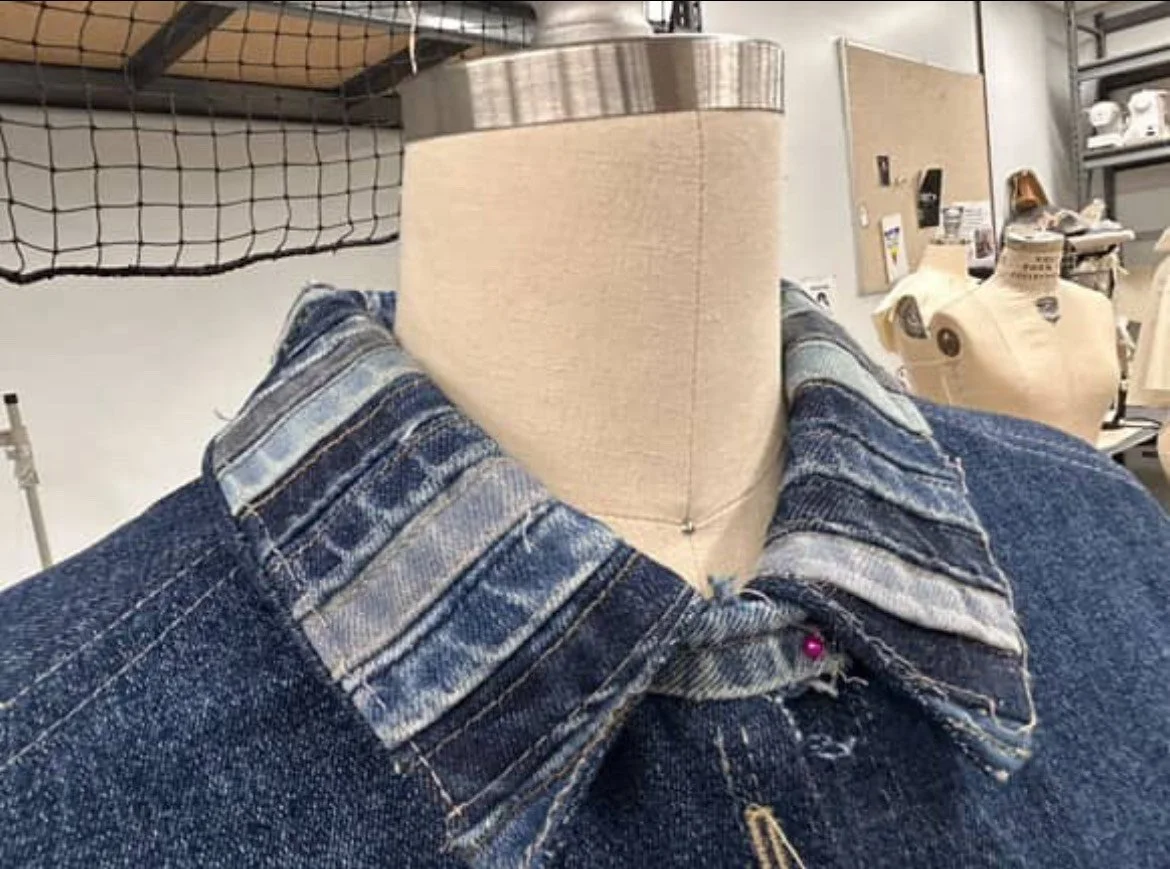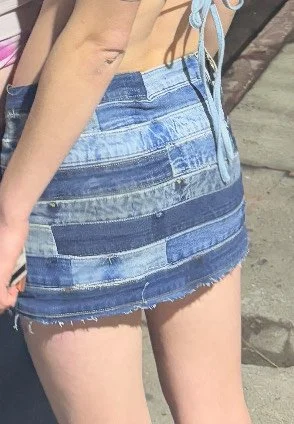Exposed Seams: Inspirational Upcycling
This past Friday, Bahala’s weekly Coffee and Connections welcomed designer and upcycler Hayleigh Smith—just in time for Halloween night.
Morning light picked out the bounty Hayleigh brought to help us zhush up our costumes. Scissors, sparkly paint, yards of rhinestone ribbon, feathers, and other accoutrements festooned tables outside of Elabrew. For the more adventurous, needles and thread in every color imaginable beckoned, along with her generous offer of quick sewing lessons. Surrounded by fabric and super glue, Hayleigh’s mission—like Bahala’s— invites us to rebuild the world. Together, we practiced transforming what is into what could be. Not from scratch, but from scraps.
Hayleigh’s life, like her art, is a patchwork: pieces of loss, laughter, travel, and transformation stitched together into something resilient and full of texture.
She was seven when her mother died. Loss cracked her world open irreparably, but also made space for imagination to take root. “There was a lot of room to express myself independently,” she recalls. Growing up in Hollister with six siblings and a single father, chaos was inevitable, but so was creativity. She found her mother’s old sewing machine and taught herself to sew, threading her way through grief and curiosity. What began as experimentation soon turned into devotion.
She started with jeans. “I’d make boys’ jeans into skinny jeans,” she says, laughing. It came naturally — part necessity, part rebellion, part play. She learned to reuse and reimagine, extending the lifespan of whatever she touched. Every scrap of fabric carried a story, and she refused to let any of them end prematurely. “I like to use something to its fullest potential,” she says. “Old T-shirts, denim, even stains — they all have something left to give.”
Before the sewing studio, there was the stage. For eight years, including during her time as a student studying creative writing and marketing at USC, she performed stand-up comedy—an art form that, like sewing, demands precision, timing, and a willingness to be vulnerable. “Poetry came first,” she says, remembering the spoken-word performances she gave in high school. But comedy sharpened her sense of language. “In stand-up, you have such a limited time. You have to be conscious of what you’re saying. Every word counts. Sewing is a bit more forgiving. There’s a place to hide some of the seams.”
Her jokes often carried a satirical edge, born of pain but tempered with laughter. “You have to laugh, otherwise you cry,” she says, describing how humor became both a coping mechanism and a philosophy. Traveling around Los Angeles with her headliner, who later died of brain cancer, left her with a deep sense of impermanence. “At 27, it feels like I’ve already lived multiple lives,” she says quietly. That awareness of fragility seeps into everything she creates.
When the pandemic hit in 2020, the world slowed, but her hands didn’t. She began sewing in earnest. Just shy of 10,000 hours later, it has become not just a craft, but a language. “Sewing speaks for itself,” she says. “It’s a physical representation of art. With stand-up or writing, you’re exposed. It’s all words and emotion. But with fabric, it’s tangible. It exists outside of you.”
For Hayleigh, sustainability inspires her artistic vision and self-expression, turning would-be waste into wearable art. At Santa Monica College, she won first place in the Salvation Army’ upcycling challenge using nothing but discarded denim. “Those jeans were going to the landfill,” she says. “So I dissected them — took apart the seams, separated the waistbands, and started piecing them back together.” The result? A mosaic of blue hues — a mini skirt made entirely of waistbands, and a jacket layered with hems that traced the skyline of a city.
Her philosophy is simple: nothing is useless. “It’s a use the whole animal, nose-to-tail approach,” she says. “Use something to its fullest potential.” Even a ketchup stain doesn’t spell the end for a favorite shirt — “tie-dye it, patch it, make it part of the pattern,” she insists. Each repair is an act of renewal, each stitch a gesture of care.
That care extends beyond materials. For her, sewing has become a way to build community — a circular cycle of friendship, education, and creative exchange. She hosts small tailoring sessions, helping people transform old clothes instead of discarding them. “With kids, it’s fast and easy — they grow out of things so quickly. It’s a way to teach them that nothing’s really ‘trash.’”
She leads embellishment workshops — feathers, rhinestones, embroidery — inviting others to discover joy in reimagining the everyday. “Instead of donating something, ask: how can I make it into a bag? Or tailor it to fit me?” she says. “It’s not just fashion. It’s empowerment.”
Her artistic lineage runs through her family. Her sister Honey creates hand cut collages that are tongue-in-cheek yet deeply emotional. “Her work has this compelling energy, but it’s also provocative. She’s one of my biggest inspirations.” Together, they’ve built a creative ecosystem rooted in humor, honesty, and a shared desire to transform pain into beauty.
Hayleigh’s style reflects her paradoxical sensibilities: a mix of gothic and modern, structured yet playful. On her Instagram, she wears pieces that feel both timeless and utterly unique: skirts made of patchwork mosaics, jackets reborn from scraps, joy stitched into every seam.
When she speaks about sustainability, it’s not with moralism but with curiosity. “I didn’t know about upcycling until I had the words for it,” she admits. “It’s not anyone’s fault. I didn’t know about pollution until I learned.” Her work now is as much about education as it is about art. Each commission, made to order, tailored to the customer, is an invitation to slow down, to value the process, to rediscover intimacy in creation.
Writing, sewing, stand-up — all her mediums loop back to the same truth: the act of making is also the act of mending. Whether she’s crafting satirical poems or layering fabric, she’s telling stories that insist on transformation. “I like seeing and designing,” she says. “Different mediums give you different ways to pivot, but under it all, it’s the same instinct — to connect.”
Connection, after all, is what drives her art—between people, between objects, between moments of laughter and grief. “Fabric holds memory,” she says. “When you wear something you’ve altered yourself, it feels different. Warmer, somehow. Like it knows you.”
There’s a quiet wisdom in that — a belief that even the most worn, the most broken, the most forgotten can be made new again. And maybe that’s what her work is really about: not perfection, but persistence. Not discarding, but rebuilding. Not erasing the stain, but finding beauty in it. In Hayleigh’s world, every thread counts.
Jessica Cole





